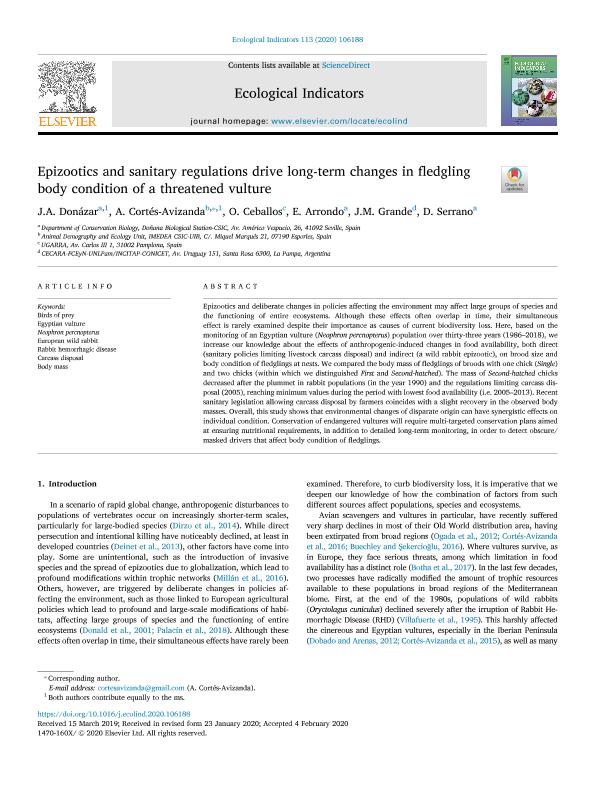Mostrar el registro sencillo del ítem
dc.contributor.author
Donázar, José Antonio
dc.contributor.author
Cortés Avizanda, Ainara
dc.contributor.author
Ceballos Ruiz, Olga
dc.contributor.author
Arrondo, Eneco
dc.contributor.author
Grande, Juan Manuel

dc.contributor.author
Serrano, David
dc.date.available
2020-09-24T15:45:28Z
dc.date.issued
2020-06
dc.identifier.citation
Donázar, José Antonio; Cortés Avizanda, Ainara; Ceballos Ruiz, Olga; Arrondo, Eneco; Grande, Juan Manuel; et al.; Epizootics and sanitary regulations drive long-term changes in fledgling body condition of a threatened vulture; Elsevier Science; Ecological Indicators; 113; 106188; 6-2020; 1-7
dc.identifier.issn
1470-160X
dc.identifier.uri
http://hdl.handle.net/11336/114749
dc.description.abstract
Epizootics and deliberate changes in policies affecting the environment may affect large groups of species and the functioning of entire ecosystems. Although these effects often overlap in time, their simultaneous effect is rarely examined despite their importance as causes of current biodiversity loss. Here, based on the monitoring of an Egyptian vulture (Neophron percnopterus) population over thirty-three years (1986–2018), we increase our knowledge about the effects of anthropogenic-induced changes in food availability, both direct (sanitary policies limiting livestock carcass disposal) and indirect (a wild rabbit epizootic), on brood size and body condition of fledglings at nests. We compared the body mass of fledglings of broods with one chick (Single) and two chicks (within which we distinguished First and Second-hatched). The mass of Second-hatched chicks decreased after the plummet in rabbit populations (in the year 1990) and the regulations limiting carcass disposal (2005), reaching minimum values during the period with lowest food availability (i.e. 2005–2013). Recent sanitary legislation allowing carcass disposal by farmers coincides with a slight recovery in the observed body masses. Overall, this study shows that environmental changes of disparate origin can have synergistic effects on individual condition. Conservation of endangered vultures will require multi-targeted conservation plans aimed at ensuring nutritional requirements, in addition to detailed long-term monitoring, in order to detect obscure/masked drivers that affect body condition of fledglings.
dc.format
application/pdf
dc.language.iso
eng
dc.publisher
Elsevier Science

dc.rights
info:eu-repo/semantics/openAccess
dc.rights.uri
https://creativecommons.org/licenses/by-nc-nd/2.5/ar/
dc.subject
BIRDS OF PREY
dc.subject
BODY MASS
dc.subject
CARCASS DISPOSAL
dc.subject
EGYPTIAN VULTURE
dc.subject
EUROPEAN WILD RABBIT
dc.subject
NEOPHRON PERCNOPTERUS
dc.subject
RABBIT HEMORRHAGIC DISEASE
dc.subject.classification
Conservación de la Biodiversidad

dc.subject.classification
Ciencias Biológicas

dc.subject.classification
CIENCIAS NATURALES Y EXACTAS

dc.subject.classification
Zoología, Ornitología, Entomología, Etología

dc.subject.classification
Ciencias Biológicas

dc.subject.classification
CIENCIAS NATURALES Y EXACTAS

dc.title
Epizootics and sanitary regulations drive long-term changes in fledgling body condition of a threatened vulture
dc.type
info:eu-repo/semantics/article
dc.type
info:ar-repo/semantics/artículo
dc.type
info:eu-repo/semantics/publishedVersion
dc.date.updated
2020-09-02T19:13:09Z
dc.journal.volume
113
dc.journal.number
106188
dc.journal.pagination
1-7
dc.journal.pais
Países Bajos

dc.journal.ciudad
Amsterdam
dc.description.fil
Fil: Donázar, José Antonio. Consejo Superior de Investigaciones Científicas. Estación Biológica de Doñana; España
dc.description.fil
Fil: Cortés Avizanda, Ainara. Consejo Superior de Investigaciones Científicas. Estación Biológica de Doñana; España
dc.description.fil
Fil: Ceballos Ruiz, Olga. Consejo Superior de Investigaciones Científicas. Estación Biológica de Doñana; España
dc.description.fil
Fil: Arrondo, Eneco. Consejo Superior de Investigaciones Científicas. Estación Biológica de Doñana; España
dc.description.fil
Fil: Grande, Juan Manuel. Consejo Superior de Investigaciones Científicas. Estación Biológica de Doñana; España. Consejo Nacional de Investigaciones Científicas y Técnicas. Instituto de Ciencias de la Tierra y Ambientales de La Pampa. Universidad Nacional de La Pampa. Facultad de Ciencias Exactas y Naturales. Instituto de Ciencias de la Tierra y Ambientales de La Pampa; Argentina
dc.description.fil
Fil: Serrano, David. Consejo Superior de Investigaciones Científicas. Estación Biológica de Doñana; España
dc.journal.title
Ecological Indicators

dc.relation.alternativeid
info:eu-repo/semantics/altIdentifier/doi/http://dx.doi.org/10.1016/j.ecolind.2020.106188
dc.relation.alternativeid
info:eu-repo/semantics/altIdentifier/url/https://www.sciencedirect.com/science/article/abs/pii/S1470160X20301254
Archivos asociados
